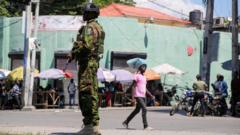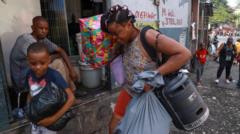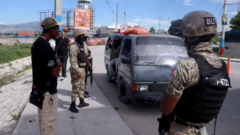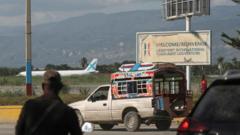With over 4,000 lives lost and a politically unstable environment marked by frequent changes in leadership, Haiti is grappling with a critical humanitarian crisis as gangs expand their territory, leading to calls for urgent intervention and relief.
Escalating Crisis in Haiti Amidst Gang Violence and Political Instability

Escalating Crisis in Haiti Amidst Gang Violence and Political Instability
Haiti faces a dire situation as political strife and gang activity escalate, prompting international concern and internal despair.
Haiti, a nation grappling with the dual challenges of rampant gang violence and political unrest, has seen its situation deteriorate alarmingly. In 2024 alone, the country has witnessed the killing of at least 4,000 individuals and the dismissal of three prime ministers. Armed groups have become increasingly authoritarian, so much so that they effectively forced the closure of Haiti's international airport on two occasions due to overwhelming violence.
Despite a vast $600 million investment from the United States intended to establish a police force dedicated to restoring order, violence has surged, resulting in the Federal Aviation Administration (FAA) issuing warnings against U.S. aircraft flying under 10,000 feet within Haitian airspace for fear of gang attacks. Presently, a new interim prime minister has taken charge, but the pervasive threat of gang violence continues to deepen the already desperate state of the Haitian populace.
Experts express frustration at the lack of solutions. Susan D. Page, a law professor from the University of Michigan and former UN official, articulated the confusion surrounding the crisis, stating, “I am at a complete loss. Everyone is just kind of astounded.”
The roots of Haiti’s turmoil stretch back over the last 15 years and are characterized by a series of compounding disasters, including a catastrophic earthquake, mismanaged foreign aid, ineffective international interventions, and contentious electoral processes. With substantial portions of the country under the dominion of gangs, the struggle to achieve peace and stability remains an arduous and pressing challenge for both Haitians and the international community alike.
Despite a vast $600 million investment from the United States intended to establish a police force dedicated to restoring order, violence has surged, resulting in the Federal Aviation Administration (FAA) issuing warnings against U.S. aircraft flying under 10,000 feet within Haitian airspace for fear of gang attacks. Presently, a new interim prime minister has taken charge, but the pervasive threat of gang violence continues to deepen the already desperate state of the Haitian populace.
Experts express frustration at the lack of solutions. Susan D. Page, a law professor from the University of Michigan and former UN official, articulated the confusion surrounding the crisis, stating, “I am at a complete loss. Everyone is just kind of astounded.”
The roots of Haiti’s turmoil stretch back over the last 15 years and are characterized by a series of compounding disasters, including a catastrophic earthquake, mismanaged foreign aid, ineffective international interventions, and contentious electoral processes. With substantial portions of the country under the dominion of gangs, the struggle to achieve peace and stability remains an arduous and pressing challenge for both Haitians and the international community alike.

















